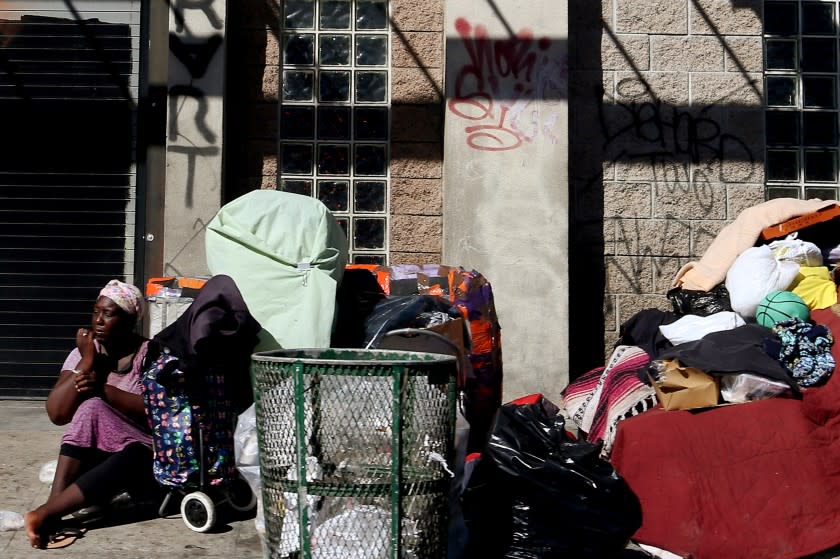Several L.A. City Council members back law to ban homeless camps near city shelters

Several Los Angeles City Council members are pushing for a new law that would make it illegal for homeless people to set up camps near freeway overpasses and the city's new temporary "bridge" shelters.
A motion to be considered by the council Tuesday asks City Atty. Mike Feuer to draft a new ordinance that would allow the removal of tents and other makeshift shelters close to the nearly two dozen shelters that have opened in the last two years under Mayor Eric Garcetti's A Bridge Home program, as well as other facilities planned around the city in response to a lawsuit currently being heard in federal court.
Feuer issued a statement Friday saying he supports the motion, coauthored by council members Joe Buscaino, Bob Blumenfield, Monica Rodriguez and Paul Krekorian and seconded by three others.
"My office has been working with council member Blumenfield on this approach, which I've long supported," the statement from Feuer said. "I support this rule for two reasons: It may reduce the temptation of any shelter resident to fall back into life on the street, and may help encourage neighborhoods to more readily accept desperately needed homeless housing and services in their communities."
After a hiatus caused by the COVID-19 pandemic, the City Council voted in July to resume cleanups of camps near the shelters. But those cleanups, conducted by the city's Bureau of Sanitation, are not intended to force campers to leave. The city's authority to enforce its anti-camping law has been successfully blocked in court decisions.
The council members, in effect, are asking the city attorney to write a new law that threads the needle between the public interest of preventing the buildup of camps around the shelters and the constitutional right of homeless people to live in public spaces.
The motion, scheduled to be heard by the council Tuesday, asks the city attorney to replace the city's anti-camping law with a new one consistent with a 2018 federal appeals court decision that declared laws that prohibit camping in public spaces unconstitutional when no alternative shelter is available.
The city had already ceased enforcing its anti-camping ordinance as a result of earlier litigation.
The motion calls for the new ordinance to "ban sitting, sleeping or lying" within 500 feet of a designated freeway overpass, underpass, ramp, tunnel, or pedestrian subway or "a facility opened after January 1, 2018, to provide housing, shelter, supportive services, safe parking or storage to homeless persons."
The proposal adds a new layer to the city's response to a court case in which federal Judge David O. Carter is pressing city officials to build more shelters to allow the removal of homeless camps from freeway underpasses, which he views as a health hazard. Responding to that pressure, individual council members are developing plans for tiny-house villages, safe parking sites and additional shelters.
Blumenfield and Councilman Curren Price, who seconded the motion, have asked Carter for more clarity on how they can prevent encampments from forming around the new shelters.
Attorney Shayla Myers, who represents homeless advocates intervening in the case, criticized the proposal as an "insidious" criminalization of homelessness that will only worsen the crisis.
"Criminalizing people for being on the sidewalk doesn't help," Myers said. "It forces people to move away from the services they need. It traumatizes them. It does nothing to help address the issues of homelessness."
An announcement of the proposal on Buscaino's Twitter account Wednesday touched off a wave of criticism from homeless advocates.
Today, I gave direction to the City Attorney to draft an ordinance that prohibits tents and personal property on any street or sidewalk in proximity to homeless facilities. Neighborhoods that provide solutions to homelessness deserve to have their public spaces returned to them. pic.twitter.com/Y6gw6tnIKN
— Joe Buscaino (@JoeBuscaino) October 21, 2020
"Using the city's resources to disrupt the lives of the city's most vulnerable is despicable and inhumane," said one comment typical of the hundreds responding to the proposal. "Everyone has the right to public spaces."
A spokesman for Buscaino defended the proposal as part of a strategy to encourage more temporary housing for people living on the street.
The councilman "fought long and hard" in the face of bitter neighborhood opposition to get three shelters in his district, senior advisor Branimir Kvartuc said.
The majority of homeless people near the shelters have gone inside, but a small percentage who refuse are damaging public support and thus dampening the prospects for additional shelters elsewhere, he said.
"It's a way to compel other neighborhoods, other municipalities to build so we can get everybody off the street," Kvartuc said. "If all of a sudden you put up a bridge home and it gets better, everybody else is going to want to put up a bridge home. That's the motivation."
Kvartuc said the neighboring cities of Torrance and Carson have no shelters and exacerbate problems in Los Angeles by making homeless people unwelcome.
This story originally appeared in Los Angeles Times.

